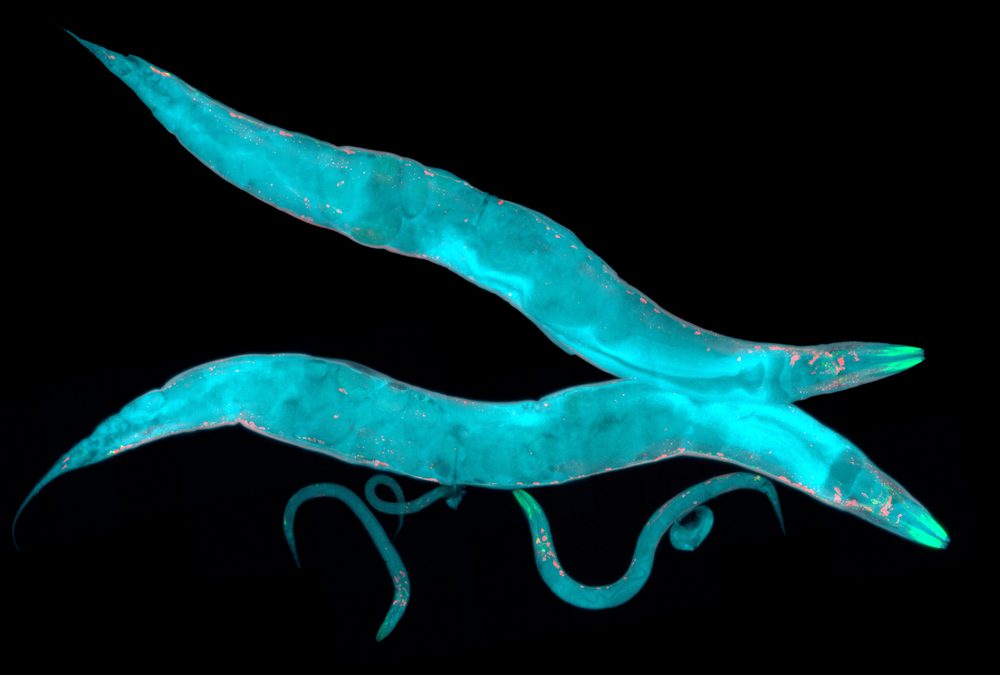In 1963, Dr. Sydney Brenner, a South African biologist, went looking for a model organism to advance the study of biological development, specifically targeting the nervous system. What he found was Caenorhabditis elegans, or C. elegans for short. C. elegans is a small, free-living (i.e. non-parasitic) roundworm. Dr. Brenner chose C. elegans to be the model organism since it is one of the simplest organisms with a nervous system. The nervous system of every C. elegans specimen contains exactly 302 neurons, and this consistency between individuals makes them perfect for study. Studies with C. elegans have also branched out to include other fields such as embryogenesis, sex determination, and larval development. Research using C. elegans has led to discoveries in areas such as programmed cell death (a.k.a. apoptosis, which is an important process in the study of diseases like Leukemia), RNA interference, nicotine addiction (worms respond to nicotine similarly to the way mammals do), ageing research, and space research including zero gravity effects on development, muscle atrophy, etc.
C. elegans has a lot of characteristics that make it desirable for research in general. The specimens are small; they measure about 1 millimeter in length. They eat bacteria (such as E. coli), so they can be easily grown on agar plates with up to 10,000 worms on a single petri dish. Most adult C. elegans specimens are hermaphroditic, and each hermaphroditic worm can produce 300-350 offspring, so breeding for specific mutations can be done relatively easily. They also have short development times (3 days from egg to adult) and life spans (2-3 weeks), so studying genetic effects across generations is possible over short time periods. C. elegans can also survive while frozen in liquid nitrogen, making long-term storage of specific mutations possible for future studies.
However, the most unique characteristic of C. elegans is that every hermaphroditic adult has the exact same number of somatic cells: 959. The position of the cells is also consistent between each worm. The worms are transparent, so their interior biology can be observed using light microscopy. All of these factors combine to allow researchers to track the development process of every single cell in the organism. In fact, the development fate of every single somatic cell in C. elegans, from egg to adult, has been studied and mapped.
In addition to the multitude of physical characteristics that make C. elegans a good model organism, the genetics of the worm are also scientifically valuable. C. elegans has a small genome, about 1/30th the size of the human genome, which makes it easier to study specific genetic functions and interactions. However, even with a much smaller genome, many of the genes that are implicated in human disease – 40% of them, in fact – are present in the C. elegans genome. Additionally, it’s possible to introduce new genes into worms, including genes from humans. Using approaches like this, it’s possible to study many human diseases, such as Alzheimer’s, by creating a genetic model for them using C. elegans. C. elegans was the first multicellular organism to have its genome fully sequenced, and in 2012 it became the only organism to have its connectome (essentially the “wiring diagram” of the nervous system) completed.
Storage of live C. elegans samples is best done in a controlled environment. While the worms can be maintained anywhere between 16°C and 25°C, C. elegans growth rate is temperature-dependent (they grow faster at warmer temperatures), so the storage temperature can be used as a variable when planning experiments. Powers Scientific’s Refrigerated Incubators offer a flexible growth environment for studies involving C. elegans. These versatile chambers can be adapted to create environments requiring vibration resistance, complete darkness, intense lighting, or a combination of variables. The chambers have a 2-50°C temp range, easily capable of maintaining any temperature needed to maintain C. elegans stocks. The chambers also have available options to provide complete lighting control (with solid doors and clock-controlled lights) or additive humidity generation if desired.
For more information about our Refrigerated Incubators or to request a quote, visit our Contact Us page or call us at (800) 998-0500.

